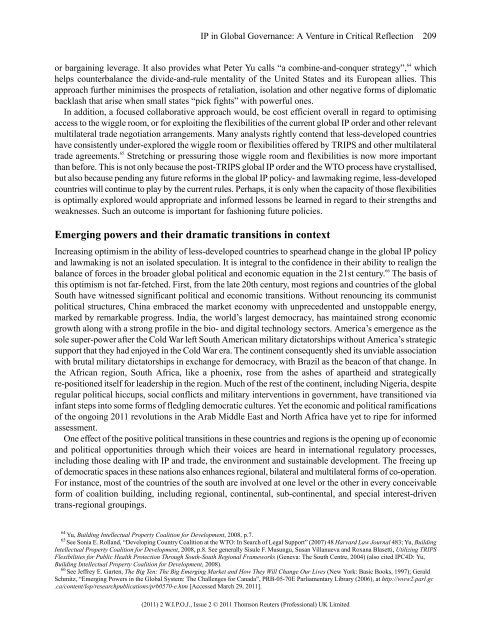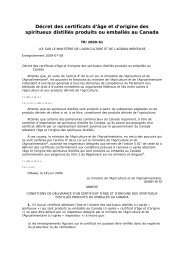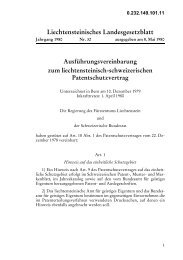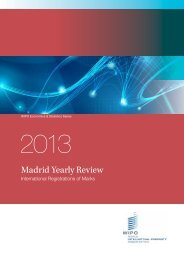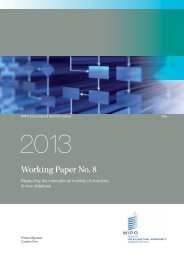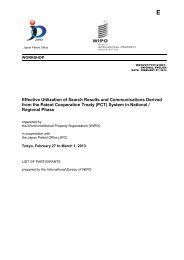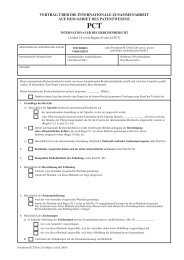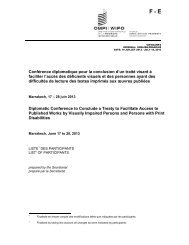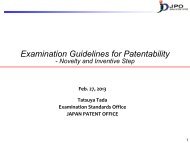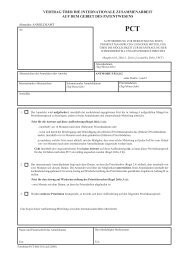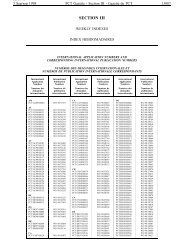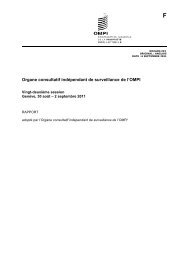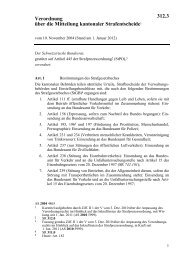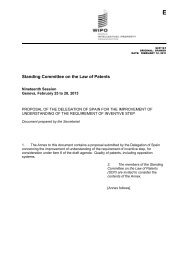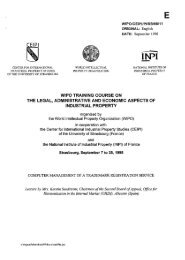WIPO Journal - World Intellectual Property Organization
WIPO Journal - World Intellectual Property Organization
WIPO Journal - World Intellectual Property Organization
You also want an ePaper? Increase the reach of your titles
YUMPU automatically turns print PDFs into web optimized ePapers that Google loves.
IP in Global Governance: A Venture in Critical Reflection 209<br />
or bargaining leverage. It also provides what Peter Yu calls “a combine-and-conquer strategy”, 64 which<br />
helps counterbalance the divide-and-rule mentality of the United States and its European allies. This<br />
approach further minimises the prospects of retaliation, isolation and other negative forms of diplomatic<br />
backlash that arise when small states “pick fights” with powerful ones.<br />
In addition, a focused collaborative approach would, be cost efficient overall in regard to optimising<br />
access to the wiggle room, or for exploiting the flexibilities of the current global IP order and other relevant<br />
multilateral trade negotiation arrangements. Many analysts rightly contend that less-developed countries<br />
have consistently under-explored the wiggle room or flexibilities offered by TRIPS and other multilateral<br />
trade agreements. 65 Stretching or pressuring those wiggle room and flexibilities is now more important<br />
than before. This is not only because the post-TRIPS global IP order and the WTO process have crystallised,<br />
but also because pending any future reforms in the global IP policy- and lawmaking regime, less-developed<br />
countries will continue to play by the current rules. Perhaps, it is only when the capacity of those flexibilities<br />
is optimally explored would appropriate and informed lessons be learned in regard to their strengths and<br />
weaknesses. Such an outcome is important for fashioning future policies.<br />
Emerging powers and their dramatic transitions in context<br />
Increasing optimism in the ability of less-developed countries to spearhead change in the global IP policy<br />
and lawmaking is not an isolated speculation. It is integral to the confidence in their ability to realign the<br />
balance of forces in the broader global political and economic equation in the 21st century. 66 The basis of<br />
this optimism is not far-fetched. First, from the late 20th century, most regions and countries of the global<br />
South have witnessed significant political and economic transitions. Without renouncing its communist<br />
political structures, China embraced the market economy with unprecedented and unstoppable energy,<br />
marked by remarkable progress. India, the world’s largest democracy, has maintained strong economic<br />
growth along with a strong profile in the bio- and digital technology sectors. America’s emergence as the<br />
sole super-power after the Cold War left South American military dictatorships without America’s strategic<br />
support that they had enjoyed in the Cold War era. The continent consequently shed its unviable association<br />
with brutal military dictatorships in exchange for democracy, with Brazil as the beacon of that change. In<br />
the African region, South Africa, like a phoenix, rose from the ashes of apartheid and strategically<br />
re-positioned itself for leadership in the region. Much of the rest of the continent, including Nigeria, despite<br />
regular political hiccups, social conflicts and military interventions in government, have transitioned via<br />
infant steps into some forms of fledgling democratic cultures. Yet the economic and political ramifications<br />
of the ongoing 2011 revolutions in the Arab Middle East and North Africa have yet to ripe for informed<br />
assessment.<br />
One effect of the positive political transitions in these countries and regions is the opening up of economic<br />
and political opportunities through which their voices are heard in international regulatory processes,<br />
including those dealing with IP and trade, the environment and sustainable development. The freeing up<br />
of democratic spaces in these nations also enhances regional, bilateral and multilateral forms of co-operation.<br />
For instance, most of the countries of the south are involved at one level or the other in every conceivable<br />
form of coalition building, including regional, continental, sub-continental, and special interest-driven<br />
trans-regional groupings.<br />
64 Yu, Building <strong>Intellectual</strong> <strong>Property</strong> Coalition for Development, 2008, p.7.<br />
65 See Sonia E. Rolland, “Developing Country Coalition at the WTO: In Search of Legal Support” (2007) 48 Harvard Law <strong>Journal</strong> 483; Yu, Building<br />
<strong>Intellectual</strong> <strong>Property</strong> Coalition for Development, 2008, p.8. See generally Sisule F. Musungu, Susan Villanueva and Roxana Blasetti, Utilizing TRIPS<br />
Flexibilities for Public Health Protection Through South-South Regional Frameworks (Geneva: The South Centre, 2004) (also cited IPC4D: Yu,<br />
Building <strong>Intellectual</strong> <strong>Property</strong> Coalition for Development, 2008).<br />
66 See Jeffrey E. Garten, The Big Ten: The Big Emerging Market and How They Will Change Our Lives (New York: Basic Books, 1997); Gerald<br />
Schmitz, “Emerging Powers in the Global System: The Challenges for Canada”, PRB-05-70E Parliamentary Library (2006), at http://www2.parl.gc<br />
.ca/content/lop/researchpublications/prb0570-e.htm [Accessed March 29, 2011].<br />
(2011) 2 W.I.P.O.J., Issue 2 © 2011 Thomson Reuters (Professional) UK Limited


